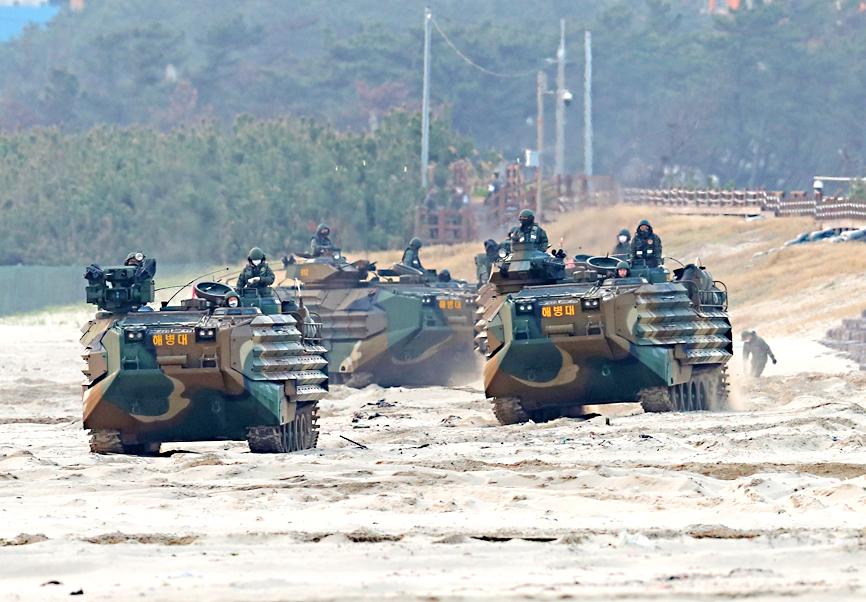Advisers to South Korean president-elect Yoon Suk-yeol sought redeployment of US strategic assets, such as nuclear bombers and submarines, to the Korean Peninsula during talks held on a visit to Washington, one of the advisers said yesterday.
The team of foreign policy and security aides to Yoon met US National Security Adviser Jake Sullivan, as Yoon seeks a more constant security presence to deter threats from North Korea as it steps up weapons tests.
“Deploying the strategic assets is an important element of reinforcing the extended deterrence, and the issue naturally came up during the discussions,” Park Jin, a four-term lawmaker who led the delegation, told reporters.

Photo: EPA-EFE
He added that both sides explored ways to bolster US extended nuclear deterrence at the talks on coordinating efforts against the North Korean threat held on a trip that also aimed to secure an early summit with US President Joe Biden.
Asked about such talks and whether Washington supported the deployments to South Korea, a White House official said that both sides had “discussed generally” the US defense commitments.
Yoon, set to be sworn in on May 10, is mapping out his foreign policy agenda after winning the March 9 election, just as tension flares after Pyongyang launched an intercontinental ballistic missile (ICBM) last month.
The deployment of US bombers, aircraft carriers and nuclear submarines is part of Yoon’s election plank promising to “respond firmly” to the North’s threats.
Yoon has also vowed to “normalize” joint military drills with the US that were scaled back under South Korean President Moon Jae-in, in a bid to placate Pyongyang and resume stalled talks to rid the peninsula of nuclear weapons.
North Korea has long denounced the exercises as a rehearsal for war, and the allies have reduced field training and shunned use of major weapons, such as bombers and air carriers, focusing instead on computer simulations.
However, Park did not elaborate when asked about plans for regular spring exercises, which local media have said could include nuclear bombers for the first time in nearly five years.
“We agreed that what’s most important is to maintain deterrence so that we can strongly respond to any possible North Korean provocations,” he said, whether ICBM launches or psychological warfare in the form of verbal attacks.
The delegation invited Biden to visit Seoul when he travels to Asia to meet the Quad grouping of nations, which also includes Japan, Australia and India, Park added.
He also delivered a letter to Biden from Yoon highlighting his “solid willingness and vision” to advance ties not only on North Korea, but also economic security and other issues, he said.

A fire caused by a burst gas pipe yesterday spread to several homes and sent a fireball soaring into the sky outside Malaysia’s largest city, injuring more than 100 people. The towering inferno near a gas station in Putra Heights outside Kuala Lumpur was visible for kilometers and lasted for several hours. It happened during a public holiday as Muslims, who are the majority in Malaysia, celebrate the second day of Eid al-Fitr. National oil company Petronas said the fire started at one of its gas pipelines at 8:10am and the affected pipeline was later isolated. Disaster management officials said shutting the

US Vice President J.D. Vance on Friday accused Denmark of not having done enough to protect Greenland, when he visited the strategically placed and resource-rich Danish territory coveted by US President Donald Trump. Vance made his comment during a trip to the Pituffik Space Base in northwestern Greenland, a visit viewed by Copenhagen and Nuuk as a provocation. “Our message to Denmark is very simple: You have not done a good job by the people of Greenland,” Vance told a news conference. “You have under-invested in the people of Greenland, and you have under-invested in the security architecture of this

Japan unveiled a plan on Thursday to evacuate around 120,000 residents and tourists from its southern islets near Taiwan within six days in the event of an “emergency”. The plan was put together as “the security situation surrounding our nation grows severe” and with an “emergency” in mind, the government’s crisis management office said. Exactly what that emergency might be was left unspecified in the plan but it envisages the evacuation of around 120,000 people in five Japanese islets close to Taiwan. China claims Taiwan as part of its territory and has stepped up military pressure in recent years, including

UNREST: The authorities in Turkey arrested 13 Turkish journalists in five days, deported a BBC correspondent and on Thursday arrested a reporter from Sweden Waving flags and chanting slogans, many hundreds of thousands of anti-government demonstrators on Saturday rallied in Istanbul, Turkey, in defence of democracy after the arrest of Istanbul Mayor Ekrem Imamoglu which sparked Turkey’s worst street unrest in more than a decade. Under a cloudless blue sky, vast crowds gathered in Maltepe on the Asian side of Turkey’s biggest city on the eve of the Eid al-Fitr celebration which started yesterday, marking the end of Ramadan. Ozgur Ozel, chairman of the main opposition Republican People’s Party (CHP), which organized the rally, said there were 2.2 million people in the crowd, but